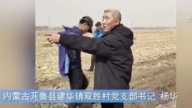【新唐人2014年03月24日訊】從今年2月中旬開始,人民幣開始了一波快速持續貶值,到目前為止貶值幅度已經超過3%,超過了去年全年升值幅度。人民幣貶值帶來的後果也很嚴重:熱錢外流、經濟增速繼續下滑、房地產萎靡等。那麼,面對當前的經濟形勢,中共將如何應付呢?請看報導。
在外匯交易市場,人民幣目前跌到了1美元兌人民幣6.2255元,是去年3月以來的最低水準。
對此,美國《華爾街日報》指出,目前人民幣兌美元已經跨過了6.20元的重要紅線。《華爾街日報》引述市場參與人士的話說,如果人民幣跌破這個水準,將會觸發投資產品帳戶追加保證金,從而可能導致人民幣匯率變得更加不穩定。
名為「目標可贖回遠期合約(target-redemption forwards)」的衍生品,能在人民幣不大幅走貶的情況下,給持有人帶來穩定收入。
全球最大和最具影響力的金融服務機構之一的「摩根士丹利」估計,自去年以來,中國投資者購買了3500億美元這種離岸遠期合約,「下檔保護」多設在6.20附近,目前隨著人民幣貶值已經損失了35億美元。如果人民幣繼續貶值,那麼投資者的損失將繼續增加。
中共官媒也指出,人民幣貶值將加速富豪破產潮來臨,那些涉及大宗商品進行對外融資交易的富豪,例如﹕銅、鐵礦石、大豆、棕櫚油、橡膠、鋅、鋁、黃金以及鎳等領域的投資者,都會受到牽連。
美國「南卡羅萊納大學艾肯商學院」教授謝田認為,目前的人民幣貶值3%,這還在中共能承受的貶值範圍之內,因為它可以通過拋售手中的美元來讓人民幣升值。但是人民幣繼續貶值,中共能不能做,就是大問號了。
美國南卡羅萊納大學艾肯商學院教授謝田:「造成人民幣貶值最大的因素,一個是中國外貿不那麼強勁,開始走向衰退,造成人民幣貶值的第一個壓力﹔第二個,很可能是熱錢不斷的流出。」
統計資料顯示,2月份中國的「出口、消費、投資」這「三駕馬車」的資料都不如意。
今年2月份,中國出口總值1140.94億美元,同比下跌18.1%﹔而進口總值則為1370.82億美元,同比增長10.1%﹔貿易逆差達229.89億美元,這是近兩年以來的最大逆差。另外,同期全國社會消費品零售總額增長11.8%、固定資產投資同比增長17.9%,這都是2013年以來的新低。
央行3月18號公布的資料也顯示,2月份外匯佔款新增僅1282億元,但是過去四個月外匯新增量都在3900億以上。這也說明2月份有大量的熱錢在向外流。
香港「大和資本市場(Daiwa Capital Markets)」公司日前發佈研究報告宣稱,隨著「美聯儲」縮減量化寬鬆,加上信貸風險上升,未來將引發大批資金從中國出逃,從現在起到明年年底,人民幣預計將貶值10%。
謝田:「如果人民幣繼續貶值、熱錢外流、經濟增速下滑,它很可能會降低存款準備金率,也有可能降低利率,用其他方法來寬鬆信貸,增發鈔票。」
實際上,當前的人民幣劇烈波動對中國經濟產生了巨大影響:2月份北京樓市的成交量是近6年來的最低值,而浙江寧波地產企業「興潤置業投資有限公司(Zhejiang Xingrun Real Estate Co.)」,最近因房價下跌導致資金鏈斷裂,面臨破產。
美國《華爾街日報》指出,外界擔心已久的中國房地產泡沫破裂正在逼近。
不過,資料顯示,2013年,房地產佔中國GDP的16%,佔新增貸款的26%,貢獻了中共政府財政收入的39%。
如果房地產急劇放緩,那麼,中國經濟的增長點在哪裏?
謝田認為,中共在出現嚴重經濟危機時,只能重新走回當年胡溫體制下的「用通脹保經濟」那條路,就是通過製造通貨膨脹,把經濟危機轉嫁到中國老百姓頭上。那是中共經常走的、也是唯一能走的一條路。
採訪/易如 編輯/宋風 後製/舒燦
Where Is China Going after RMB Hits “Red Line” For Losses?
Since mid-February, the RMB has experienced a steady and
rapid depreciation by more than 3%,
exceeding the total appreciation over last year.
The devaluation has consequently caused the outflow
of hot money, a decline in economic growth,
and dropping of real estate.
How will the Communist regime face the economic crisis?
Please follow our report.
The RMB fell the lowest
from March last year to 6.2255 per dollar.
The Wall Street Journal (WSJ) reported that with the RMB
now crossing the 6.20-per-dollar threshold,
“Market players have warned that breaching that level
would trigger collateral calls on investment products that could unleash even more instability in the currency.”
The leveraged contracts such as target-redemption forwards
are structured to pay out monthly if the yuan has passed a specific threshold against the dollar.
One of the world’s largest and most influential financial
services institutions “Morgan Stanley" estimate,
since last year, Chinese investors bought $ 350 billion of
such offshore forward contracts,
" downside protection " are situated in close to 6.20 , now
with the devaluation of the RMB has lost $ 3.5 billion.
If the yuan continues to depreciate, then
the loss to investors will continue to increase.
China state-run media says that the RMB devaluation will
accelerate the bankruptcy of the rich.
Tycoons who are doing business in the popular trade sectors,
such as copper, iron ore, soybeans, palm oil, rubber, zinc,
aluminum, gold and nickel, will be affected.
Xie Tian, Professor of University of South Carolina Aiken
suggests that RMB depreciation of 3% is under the acceptance
range of Chinese Communist Party (CCP).
Because the CCP can use methods of selling dollars to appreciate RMB.
However, will the CCP carry on selling dollars if the yuan
continues to depreciate?
Xie Tian: “The major factors causing RMB depreciation are:
China’s foreign trade isn’t strong enough, it started declining;
The possiblity is that hot money repeatedly outflows.”
The data shows that in February, China’s exportation,
consumption, and investment were not as good as expected.
In February, China’s total exports are US$114 billion,
which dropped 18.1% year-on-year.
The imports value is US$137 billion in total,
which increased 10.1% year-on-year.
A trade surplus reached $22.99 billion, which
becomes the biggest trade deficit.
In addition, the national consumption goods retail sales
increased 11.8%, the fixed-asset investment increased 17.9%
year-on-year, these fell to the lowest since 2013.
China’s central bank released data on March 18 shows
that in February the funds outstanding for foreign exchange
rose by 128.2 billion yuan ($20.75 billion),
however, in the past four months, foreign reserves have
increased 390 billion yuan.
This shows that a lot of hot money out flowed in February.
Daiwa Capital Markets’ report says that as US stimulus cuts
and heightened credit risks, many funds will flow out of China,
RMB will lose 10% by the end of next year.
Xie Tian: “If RMB continuously depreciates, hot money
outflows and economic growth rapidly declines,
it is likely to lower the deposit reserve ratio and interest rate,
easing credit by other methods, ie printing more money.”
Actually, the current volatility of RMB has a huge impact
on China’s economy.
In February, Beijing house sales reached their
lowest for the past six years.
Zhejiang Xingrun Real Estate has faced bankruptcy because
housing prices dropped leading to fund chain breaking.
WSJ points out that fears have raised about
a housing bubble burst getting closer.
Data shows that in 2013, property takes up 16% of GDP,
accounts for 26% of new loads,
the Chinese regime contributed 39% of revenue.
If the real estate slows down sharply,
then where is China’s economy growth point?
Xie Tian says that facing a serious economic crisis,
the CCP only can go back to the inflation path where
Hu Jintao and Wen Jiabao had been.
In other words, the CCP creates inflation to
transfer the crisis onto the Chinese people.
This method is the only path, it is often used by the CCP.
Interview/Yiru Edit/Shongfeng Post-Production/Shucan




























